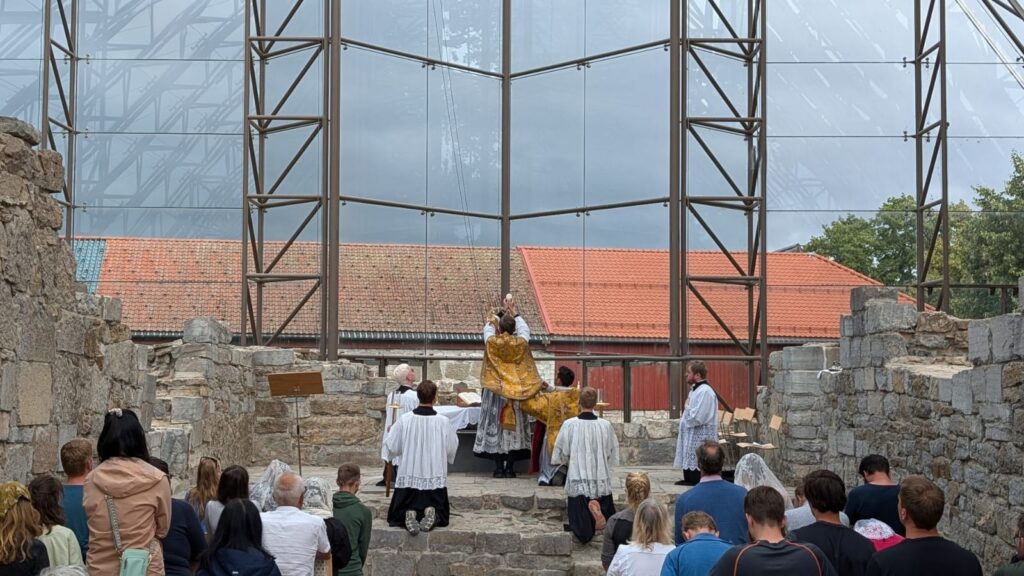German AfD party member challenges removal from church volunteer positions
By AC Wimmer
A Catholic priest in Germany has barred an altar server and lector from his duties because he works for the Alternative for Germany (AfD) party. According to a report by CNA Deutsch, CNA’s German-language news partner, the party has announced legal steps in response, but the archdiocese is backing the priest’s decision.
In early July, parish priest Father Ralf Dunker informed 20-year-old Julian-Bert Schäfer that he could no longer serve as an altar server, lector, and organist in the Parish of St. Francis of Assisi in Hamm in northwestern Germany. Dunker cited Schäfer’s active involvement with the AfD as incompatible with these volunteer duties.
While polling has shown the AfD as the second most popular party in Germany, the party is variously described in the media as a populist, right-wing, or far-right extremist outfit.
The banned altar server, an AfD member for four years and office manager for the party in the Hamm city council, denounced the decision.
“It is outrageous that a priest arbitrarily decides, without consulting the pastoral team, which political convictions are compatible with participation in Church life,” Schäfer said in a statement on Facebook. He added: “This exclusion is not only a violation of my rights as a believer but also a betrayal of the principles of tolerance and respect that the Church preaches.”
CNA Deutsch reported that the AfD official has engaged a lawyer, reportedly an AfD federal Parliament member, to challenge the decision. The legal battle is expected to revolve around the interpretation of Article 3 of the German Constitution, which prohibits discrimination based on political convictions.
Schäfer said the challenge would draw on the relevant article of the Basic Law, “which guarantees equality before the law.”
However, the Archdiocese of Paderborn is standing firmly behind Dunker’s decision. A spokesperson for the archdiocese stated, according to katholisch.de: “Based on the German Bishops’ Conference’s declaration …, it is justified to inform an active AfD functionary that he cannot exercise a voluntary office in the Catholic parish.”
The German Bishops’ Conference has taken a clear stance against the AfD. In February, it issued a declaration on nationalism that said: “Right-wing extremist parties and those that are rampant on the fringes of this ideology … cannot be a place of political activity for Christians and cannot be voted for.”
Pressure against Catholic members of AfD
The case of the dismissed altar server is not an isolated incident. In May, Bishop Stephan Ackermann of Trier upheld the dismissal of Christoph Schaufert, an AfD state parliamentarian, from a parish administrative council. Ackermann defended the decision, stating: “The exercise of political mandates for the AfD is incompatible with the exercise of the elected office in the administrative council of a parish in the Diocese of Trier.”
During protests against an AfD party congress in Essen in July, Klaus Pfeffer, vicar general of the Diocese of Essen, praised the event, according to CNA Deutsch.
However, the AfD’s popularity is rising, with recent polls showing it at about 20% nationally, making it the second-strongest political force behind the center-right Christian Democratic Union (CDU). In eastern German states, where crucial elections are set for 2024, the AfD is polling above 30% in Saxony, Thuringia, and Brandenburg.
This rise reflects broader European trends, where parties critical of mass migration, Islam, and leftist ideologies have gained significant ground, such as Marine Le Pen’s National Rally in France and Geert Wilders’ Party for Freedom in the Netherlands. Analysts attribute this also to wider concerns over demographic decline, economic uncertainties, and disillusionment with mainstream politics and media.
For the Catholic Church in Germany, the AfD’s growing strength presents a complex challenge. Church leaders have unequivocally opposed the party but risk ignoring the reality that some Catholics support — and are members of — the AfD.
As Germany approaches its next federal election in 2025, and with critical state elections sooner, the Catholic Church’s approach to the AfD will likely remain contentious. The cases of Schäfer and Schaufert may presage further conflicts as the Church balances political pressures while struggling with a steep decline in relevance and influence.
German bishops have called for dialogue with AfD voters to understand their concerns, even as they assert that “right-wing extremist parties cannot be a place of political activity for Christians.”
This article was first published by Catholic News Agency, EWTN Norway`s news partner.




